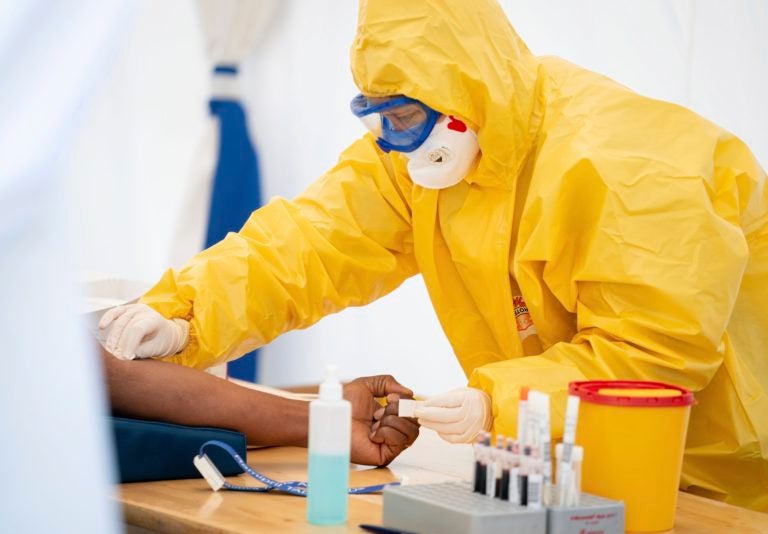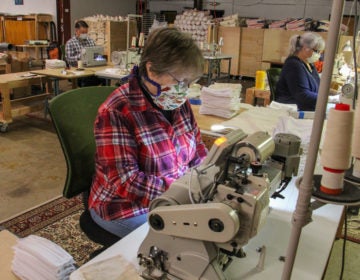What’s the antibody coronavirus test Chester County is using?
The county started its program Wednesday: 10,000 test kits have already arrived and 10,000 more are expected next week.
Listen 1:49
A paramedic takes blood from a patient in Berlin. (Kay Nietfeld/picture-alliance/dpa/AP Images)
Chester and Delaware counties recently announced they will offer antibody testing for COVID-19 to important workers like those in long-term care facilities, youth centers, and prisons. Chester County started its program Wednesday: 10,000 test kits have already arrived and 10,000 more are expected next week.
Most testing for coronavirus thus far has involved a health care worker swabbing the nose and the back of the throat, collecting material that is then screened for genetic information the virus carries. That test takes a few hours, and you might not get the results for a few days.
By contrast, the antibody test used in Chester County involves taking a blood sample, putting it on a test strip, and waiting for bands to appear in certain places, like a pregnancy test. Each test takes 15 minutes and costs $29.50, which the county will pay for.
But the test is not meant to be used by itself: Advaite, the biotech company with operations in both Chester Springs and Chicago that makes the antibody test, says anyone getting it should follow up with a traditional swab test to confirm coronavirus.
An antibody test works like this: When a foreign substance like a virus enters your body, your immune system will try to fight it by making antibodies to attack that specific intruder. Unless someone has a suppressed immune system or other health conditions, the immune system will make antibodies to a virus regardless of how severely the person is affected by it.
The immune system takes at least seven days after the virus enters the body before it makes antibodies, though some of those antibodies still stay in the blood for months or even years afterward.
An antibody test is “more a retrospective, historical review of whether you’ve been exposed to the virus,” said Alan Wells, professor of pathology at the University of Pittsburgh and medical director for UPMC Clinical Laboratories.
His team developed an antibody test for the new coronavirus that is a little more complex and takes more time: It involves using a centrifuge to separate the blood sample in a lab, to measure how high or low the antibody levels are, instead of just a yes/no test.
Without more research, Wells added, we can’t say whether having antibodies to the coronavirus means someone is immune to it.
“Everyone likes to say, ‘I have antibodies and I’m immune,’ but we can’t say that,” he said.
Advaite, which makes the test being used in Chester and Delaware counties, is waiting for emergency use authorization for it from the Food and Drug Administration. That requires further testing to answer such questions as: What happens if a sample contains more than just the new coronavirus? How high is the rate of false positives?
In the meantime, the FDA is letting companies use their tests without agency approval as long as they meet certain guidelines. To date, the FDA has authorized only one antibody test, made by a company in North Carolina. Many groups are working on antibody tests, including the Centers for Disease Control and Prevention.
Karthik Musunuri, CEO of Advaite, said his company can now make about 40,000 test kits a week, and hopes to get up to making 40,000 a day. He said other counties in Pennsylvania have asked about his product.
“We’re not superheroes by any means, but we do hope to fulfill as many requests as we can, with priority on local demands,” Musunuri said.
An antibody test can be very useful because it allows health officials to do widespread testing to figure out how far the virus has spread, and how many people have developed antibodies to fight it. That’s why the National Institutes of Health is funding huge surveys of antibody tests in New York, Seattle, Los Angeles, Boston, San Francisco, and Minneapolis. The World Health Organization is planning a global study.
An antibody test could also tell which people are less susceptible to infection and can return to work. Part of their donated blood could also be used as a treatment for the seriously ill.
Aaron Edlin, professor of economics and law at the University of California, Berkeley, has proposed a system of voluntary antibody testing to mark people as “certified recovered” from the new coronavirus — people who have had the virus, won’t get COVID-19 soon, and won’t infect other people by shedding the virus. He said those people could become a specialized labor force to get the economy going again, taking risky jobs like working with those vulnerable to the virus, food preparation, and driving buses to hospitals.
“Of course, there’s a long history of labeling people that you have to be very sensitive to, and there are dystopian scientific visions that you don’t want to get near,” Edlin said. “At the same time, we’re in an emergency.”
WHYY is your source for fact-based, in-depth journalism and information. As a nonprofit organization, we rely on financial support from readers like you. Please give today.







